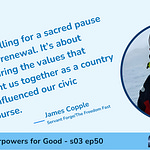When you purchase an item after clicking a link from this post, we may earn a commission.
Devin: What is your superpower?
Esha: I think my superpower is tenacity.
Over the years, Esha Chhabra and I have had a few opportunities to collaborate as journalists. When she shared a heads-up about her new book, Working to Restore, with me, I was thrilled to invite her to be a guest on the Superpowers for Good show to talk about it.
In her book, she reports on her findings about what mid-size businesses are doing to become more restorative. Esha is an early entrant into the solutions journalism community, focusing on writing not only about problems but also about how people are working to solve them.
Jenny Kassan will speak at SuperCrowd23. She’s hosting a three-day virtual training session called “Raise Capital on Your Own Terms” for diverse founders and social entrepreneurs who hope to raise $500,000 or more for their businesses. If you’re serious about your goals for impact, check it out! Use the discount code SuperCrowd20 to save 20 percent!
AI Summary
Esha Chhabra discusses her new book Working to Restore on the Superpowers for Good show.
The book covers the regenerative approach many medium-sized companies take to drive environmental and social change across different industries.
Commitment to a long-term approach is necessary for inclusivity.
Examples of companies promoting women’s roles in industries not typically known for inclusivity are cited.
A collaborative supply chain approach is encouraged.
Recommends supporting eco-friendly and community-oriented travel companies.
The book includes examples of companies and entrepreneurs committed to restoring the planet and advocating for communities.
The book aims to inspire readers to become involved in similar initiatives.
Businesses must prioritize sustainability and social justice and offer consumers value for money to be successful.
Esha’s Book: Working to Restore
“Whether you are a young college student, whether you’re somebody already working, or you’re within a large corporate entity, you can use this book,” Esha says. “Pick it up, read one chapter, read one case study of a business, put it down, revisit it later. It’ll get you thinking as to how your business or your role in that business could drive some kind of environmental and social change.”
The book has nine chapters, each covering a different sector. “We look at food, fashion, travel, finance, the energy sector, supply chains,” she says.
Esha is serious about the issues she covers, intending to have a real impact. “There’s so much greenwashing going on, and it’s now beyond just oil and gas or renewable energy space.”
She explains her approach:
As I've been doing this reporting for ten years, I've met some interesting entrepreneurs that I felt like they're so driven by their values and their mission that that is why they started the company. They didn't start the company for profit, or they didn't start the company for global scale or to have this dominant brand. It was to solve a problem. So I tried to identify people in the book that came from that place.
Esha and her subjects are so focused on change that they even avoid the word sustainability to stay as far from faking or exaggerating the impact as possible. “We moved away from the word sustainability because one entrepreneur said to me, ‘What are we sustaining? Right? This broken system? Let’s do something else. Let’s bring about a change.’”
Instead, she focuses on restoration. “The word that kept pinging me was ‘restoring’ because we’re restoring an imbalance; we’ve created an imbalance, and now we have to restore that balance,” she says. “With restorative comes this idea of regeneration, like giving life to something. When you look at regenerative agriculture, it’s about feeding the soil, giving life to the soil.”
Throughout Esha’s career, she’s used tenacity as her superpower to accomplish her work.
How to Develop Tenacity As a Superpower
Esha shares how she developed her tenacity. “I don’t know if it’s the product of being an immigrant, but I think you do just learn to just push through—and in a compassionate kind of way, not an aggressive kind of way,” she says. “But I think you do learn to just not take ‘no’ that easily. I mean, it’s not a roadblock always.”
Journalists hear the word “no” a lot, both when finding sources and pitching articles. She says, “You just can’t get knocked off by it.”
She looks at her work in solutions journalism as an example of how she’s used her tenacity to create more good in the world. The stories she’s written have not only documented solutions but helped bring resources to bear. She says some of the subjects of her pieces have let her know years later that her coverage helped scale a business or attract capital from an investor.
She offers two key points of advice for strengthening your tenacity.
First, she says, “Have a strong sense of self.”
You’ve got to be clear about some key questions. “What do you want? Who are you as a person?” She adds, “It’s kind of cliche to say, but don’t deviate from that.”
Her second point is about seeing yourself in a complete context and not comparing yourself to artificial standards. She says:
None of the companies in this book are perfect. They will tell you that, too. Once you realize that perfection doesn't exist, then I think some of that nervousness and anxiety around asking for things or pushing for ideas or starting a project—whatever it is—kind of goes to the wayside because you realize nobody really has the perfect answer or the perfect setup for anything.
By following Esha’s example and advice, you can strengthen your tenacity, perhaps making it a superpower that enables you to do more good in the world.
Guest-Provided Profile
Esha Chhabra (she/her)
About: Writer and author of the upcoming book, Working To Restore.
Website: eshachhabra.com
Twitter Handle: @esh2440
Company Facebook Page: fb.com/ec2440
Biographical Information: Esha Chhabra has been a writer and journalist focused on global development, environment, and business for over a decade. Her work has appeared in the New York Times, Economist, Guardian, Forbes, The Washington Post, Fast Company, Wired, and more. She goes beyond the greenwashing to determine if companies are pushing the needle. Her work has been supported by the UN Foundation and the Pulitzer Center in Washington, DC. Esha is a graduate of Georgetown University and the London School of Economics and Politics Science. She calls southern California home.
Linkedin: linkedin.com/in/eshac
Instagram Handle: @eshatravels
Other URL: penguinrandomhouse.com/authors/2274525/esha-chhabra/
Esha will be speaking at the virtual conference SuperCrowd23, held on May 10-11. She’ll be joining a discussion about social entrepreneurship. Don’t miss it! Superpowers for Good readers get 50 percent off the price of admission!
















